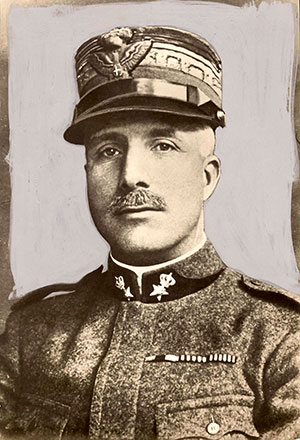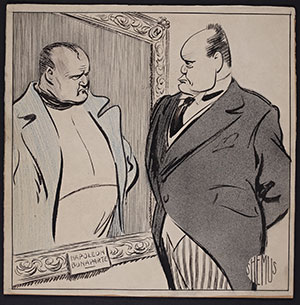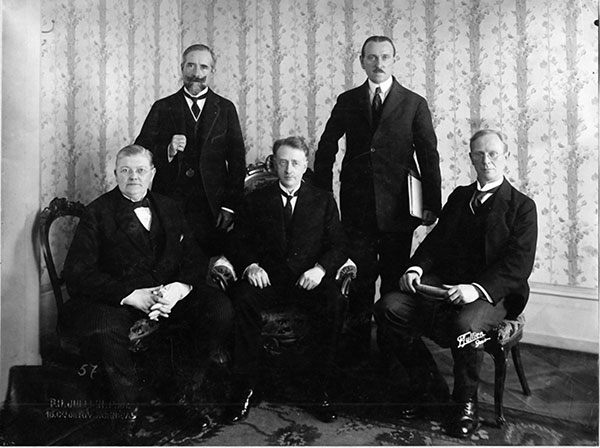Ireland and the Corfu Crisis, 1923
Published in 20th-century / Contemporary History, Features, Issue 1 (January/February 2017), Volume 25THE LITTLE-KNOWN CORFU CRISIS OF 1923 PROVIDED INEXPERIENCED IRISH DIPLOMATS WITH A BLUNT INTRODUCTION TO POWER POLITICS
By Mark Phelan
In August 1923, brigands murdered an Italian general and several of his assistant compatriots who were part of an international commission attempting to define the disputed frontier between Albania and Greece. Because the murders occurred on Greek territory, Italy’s autocratic leader, Benito Mussolini, despatched an intolerable ultimatum to Athens. Analogous to the infamous Austro-Hungarian note to Serbia of 1914, Italian demands ranged from a series of ceremonies and investigations intended to humiliate the Greek authorities to the immediate payment of a 50 million lire indemnity. When the Greeks declined to accept the unacceptable, Mussolini had a pretext to occupy the strategically important island of Corfu. Inefficiently conducted and excessively violent, the subsequent invasion of Corfu led to an international outcry against Italy.
As both Greece and Italy were member states, the Corfu Crisis also provided the inaugural test case for the League of Nations. Conceived as an international parliament with the wherewithal to avert future conflicts, this inter-war forerunner to the United Nations sat at Geneva, Switzerland. Yet Mussolini’s response to possible League intervention was swift and negative. Denying that the League held any jurisdiction in the affair, Mussolini pointed to the synonymy between Italy’s occupation of Corfu and the contemporary Franco-Belgian invasion of the Ruhr, which had likewise occurred without League sanction. This argument had a powerful effect on Italy’s wartime allies. Worried about the possible implications of allowing the League of Nations to pass judgement on a fellow ‘Great Power’, London and Paris agreed to sideline Geneva. To this end, France and the UK invoked the dubious prerogatives of the Conference of Ambassadors. Established in 1920, the Conference was essentially the old Allied supreme war council continued under another name. Because it had appointed the Albanian frontier commission in the first place, the Conference claimed precedence over the League when it came to mediating between Italy and Greece.
Irish attitudes to the League of Nations
This farce exposed the false idealism that drove the League project in the first instance, and in turn gave Irish critics of the ‘new world order’ an opportunity to voice their scepticism. Mirroring the concerns of Catholic lobbyists across Europe, lead writers in the Irish Independent and other pious publications had consistently lamented the League’s refusal to involve the Holy See in its deliberations. A longing to incorporate the Catholic Church into the machinery of Geneva aside, nationalist Ireland had not forgotten that the architects of the League had snubbed the representatives of the Republic in 1919. Obtaining recognition and support from the League had been a key strategy of the ‘second’ Sinn Féin party. An important contributing factor to the subsequent ascendancy of the physical-force tradition, this failure caused lasting resentment and popularised the belief that the League itself was simply a front for British imperialism.
That said, dominant opinion in the Irish Free State could hardly be described as ‘isolationist’. Within the political and cultural élites, in particular, there was strong support for the view that, as an ancient and historic nation, the Irish should use the League as a means of re-integrating into the world community. Pragmatists within the Department of External Affairs also argued that League membership promised much in terms of future Anglo-Irish developments, especially when it came to consolidating Ireland’s international status separate from the UK. In addition, the more fearful-minded looked upon the League Covenant as a deterrent against possible future British aggression, while optimists believed that the League might prove to be a favourable arbitrator on the thorny issue of Partition.
So it was that rational self-interest, rather than romantic naïveté, prompted the ruling Cumann na nGaedheal party to steer independent Ireland toward membership of the League of Nations. The accession process triggered the first official foreign visit by representatives of the new government. The president of the executive council of the Free State, William T. Cosgrave, led the Irish delegation to Geneva. Other members included Desmond Fitzgerald (minister for external affairs), Eoin MacNeill (minister for education) and a host of legal advisers. Following a week of hectic socialising, the Irish delegates officially assumed their seats in the Fourth Assembly of the League on 10 September 1923. To mark the occasion, President Cosgrave delivered a celebrated speech. Mixing Gaelic with English, Cosgrave emphasised the ancient Christian links between Ireland and the Continent, while anticipating a new era of positive Anglo-Irish relations. In addition to these innocuous themes, Cosgrave indirectly tackled the predicament then consuming the League. According to the author of the speech, Eoin MacNeill, passages more obviously related to the recent Anglo-Irish conflict were also applicable to the dispute between Italy and Greece. In this context, Cosgrave condemned the fact that, regardless of the outcome of the Great War, small states still had to contend with ‘the shadow of external violence, vicious penetration, and injurious pressure’. In addition to this veiled criticism of Fascist actions at Corfu, the Irish president also offered some carefully chosen words of advice for his peers at Geneva. Repeatedly invoking the Catholic mantra that God’s law applies equally between individuals, groups and sovereign states, Cosgrave expressed the hope that the Corfu Crisis would clarify the authority of the League and thus strengthen the machinery of international law and co-operation.

Above: W.T. Cosgrave arriving at the Palais des Nations, Geneva, 10 September 1923, prior to addressing the Fourth Assembly of the League of Nations. (NLI)

Above: Enrico Tellini, the Italian general murdered by brigands on the Greek side of the disputed border with Albania in August 1923.
Back in Ireland, meanwhile, Fascist propagandists worked to influence public opinion against Greece. On 13 September 1923, the Fasci all’Estero (Fascists Abroad Organisation) staged a well-choreographed event at Dublin’s pro-cathedral. Casting the net of ‘totalitarianism’ beyond Italy’s borders, this organisation sought to regulate the activities of émigré Italians. The Irish branch of Fascists Abroad remained largely circumspect until the late Mussolini era, when, expounding an ugly anti-Semitism imbibed from Hitler and the Nazis, leading members earned the attention of the Gardaí and military intelligence. The 1923 event was nevertheless an overtly political occasion. Fascist paraphernalia adorned what was supposed to be a simple commemorative ceremony for the Italian officials murdered in the Greek borderlands. A great number of those present (including the Irish contingent) wore the Fascisti badge, while others wore ribbons of the Italian national colours supplemented by a mourning ribbon. Meanwhile, uniformed Fascists, some of whom were bedecked in war decorations, provided a guard of honour for a catafalque draped in the Italian flag. Chopin’s March added to the solemnity of the occasion, as did Fascist antics during the Elevation. At this juncture, the guard of honour performed a prolonged Roman salute, thus marking the Irish début of perhaps the most notorious symbol of the inter-war era. Not only did the ceremony involve the entire Italian community in the city—c. 200 people, according to the Irish Times—but it also attracted members of the foreign diplomatic corps, leading ecclesiastics, Irish politicians and civil servants, socialites, academics and high-ranking members of the Irish military, virtually all of whom adorned themselves with an Italian emblem.

Above: As a statesman, Mussolini proved to be vain, erratic and incapable of distinguishing between his own prestige and Italian national interest, a view reflected at the time by Irish cartoonist ‘Shemus’. (NLI)
If Fascist propagandists in Dublin felt pleased with the fruits of their labour, Italian diplomats also expressed satisfaction at the contributions made by Irish speakers in Geneva. Cosgrave’s carefully worded admission speech made no direct reference to Fascist Italy. Nor did another important contribution made by Eoin MacNeill. With Cosgrave’s departure for Ireland, MacNeill headed a rump delegation that revelled in the cut and thrust of the Fourth Assembly. It fell to MacNeill to articulate the Irish response to the long-awaited report of the Conference of Ambassadors. As expected, the Greeks emerged as the scapegoats of the affair. Found guilty of negligence, they were obliged to pay the indemnity sought by Italy, while the Greek navy was obliged to render humiliating honours to a visiting Italian fleet. Nevertheless, following discreet threats to deploy the Royal Navy in defence of Britain’s Mediterranean interests, Mussolini lost the salient point and reluctantly agreed to withdraw from Corfu. For the representatives of the so-called ‘small nations’ at Geneva, however, amongst whom the Irish had clearly found a niche role, the real issue was not the conditions imposed upon Greece or Italy but that the League itself had played no part in the judgement rendered. In a widely reported speech to the Assembly, MacNeill thus struck a balance between excusing the League’s failure and lecturing its members on their future obligations. Gently chastising Mussolini and the League Council, MacNeill gave little cause for actual offence and afterwards claimed that his speech gave ‘wide satisfaction and gained very general approval’. The Italians, who announced themselves relieved that the Irish had not singled them out as the only culprits, backed up this contention.

Above: The Irish Free State delegation to the League of Nations in September 1923: (left to right) Hugh Kennedy, Bryan MacSwiney, W.T. Cosgrave, Michael MacWhite and Eoin McNeill.
Certainly, MacNeill’s tactful approach contrasted starkly with contributions made by delegates from other nations. Previous speakers, most notably on behalf of South Africa and the Scandinavian countries, thundered against Mussolini and the injury done to the League. MacNeill did not have the same freedom of action, for he could not afford to offend a regime with ample powers of interference over the constant flow of pilgrim traffic between Ireland and Italy, not to mention the substantial Irish colony in Rome itself.
Away from the Assembly, MacNeill’s final words on the Corfu Crisis actually occurred in the context of manoeuvring to protect the diplomatic independence of the Irish Free State. Following the public debate, a British official circulated a letter to the Commonwealth delegates. Singling out Lord Robert Cecil for particular praise, the letter asked its readers to register their conviction that it was the ‘resolute and wise action’ of the League that had resolved the Corfu Crisis. Although the other Dominions, including the South Africans, readily endorsed the petition, the Irish demurred. Already disapproving of the whitewash presented to the Assembly, MacNeill and his colleagues had no desire to undersign a document, apparently intended for publication, which they interpreted as partly planned to advertise the signatories as representing a distinct unit. Arguing that a united imperial front was not desirable in connection with the League of Nations, MacNeill, much to the chagrin of the British delegation, returned the proposed round robin unsigned.
Conclusion
In summary, the Corfu Crisis of 1923 had a major impact upon Irish foreign policy and public opinion. Not overly affected by the grand ideals of Geneva, Irish delegates travelled to the Fourth Assembly aware that the machinery of the League was far from perfect. In line with this outlook, the Corfu fiasco acted as a catalyst for what became a consistent Irish policy of reproving the League in the interest of reforming the organisation. Hoping for better things to come, sensitive language surrounded Irish reservations about the handling of the Corfu incident. Repeatedly invoked during subsequent crises, this approach enabled Irish diplomats to champion the principles of collective security without condemning a particular League member, and without assuming the dubious title of ‘appeasers’ either. In signing up to the Covenant, the Free State undertook to comply (as it did in the 1930s) with possible League obligations concerning military and/or economic sanctions against Italy or any other aggressor. If called upon to do so in 1923, the Irish government would have acted accordingly, for the League had not yet become the completely discredited organisation that, several inept performances later, gave birth to the policy of Irish neutrality in the late 1930s.
Mark Phelan’s Ph.D thesis explores Irish responses to Fascist Italy during the 1920s.
FURTHER READING
A. Cassels, Mussolini’s early diplomacy (Princeton, 1970).
R. Fanning, M. Kennedy, D. Keogh & E. O’Halpin (eds), Documents on Irish foreign policy, vol. 1, 1919–23 (Dublin, 1998).
M. Kennedy, Ireland at the League of Nations (Dublin, 1996).
















